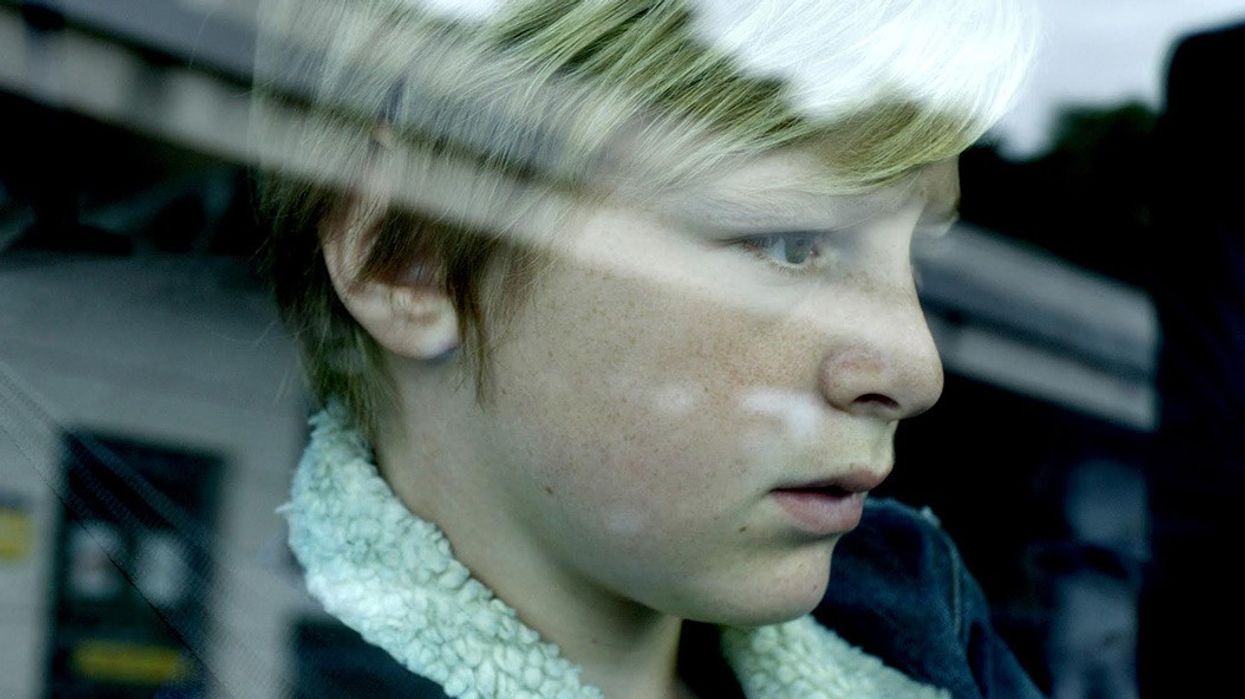How a Filmmaker Used 'Radical Directing' to Turn Realism into an Unbearable Horror-Thriller
Xavier Legrand's 'Custody' slowly reveals the horror of domestic violence.

There isn't a quiet moment Xavier Legrand's Custody. On paper, that doesn't make sense—many of the scenes are punctuated with long silences, and there is no musical score. But the silence is a loaded weapon. The film pulsates with the imminent threat of violence; writ large in the characters' body language is evidence of past physical abuse and psychological control.
Custody opens with a nearly 15-minute scene depicting a mediation hearing. Miriam (Léa Drucker) and Antoine (Denis Ménochet) are separated and vying for custody of their child, 11-year-old Julien (Thomas Gioria). The cold, clinical precision with which their respective lawyers present their cases belies the gravity of the situation: Mariam is accusing Antoine of domestic violence and considers him a danger to the child. Antoine, meanwhile, maintains that his history of spousal abuse has no bearing on his ability to parent. They are granted joint custody.
The scene sets us up for an intense ping-pong courtroom drama, akin to Asghar Farhadi's A Separation. But Legrand isn't going there. This is just the first of many times the director will thwart the audience's expectations. All while adhering to the fabric of immersive social realism, Legrand propels his film into horror territory; the final scene is one of the most unbearably tense and disturbing in recent memory.
No Film School caught up with Legrand to discuss how he engineered the film's major tonal shift, why he decided to strip his film of "cinematic entertainment," and his technique of "radical directing," which won him the Best Director award at last year’s Venice Film Festival. Legrand was also nominated for an Oscar for Custody's predecessor, the short film Just Before Losing Everything.
NFS: How did the Oscar nomination and general success of Just Before Losing Everything impact your ability to get Custody made?
Xavier Legrand: I think the success of Just Before Losing Everything, which won numerous awards at international festivals, as well as a Cesar for Best Short Film in 2014 and an Oscar nomination in the same year, drew attention to my work and convinced funders that I was legitimate enough to create a feature film. I have an acting background; I didn't study film.
NFS: How did making the short prepare you for the process of making the feature?
Legrand: Custody already existed in my head. My initial idea was to create a trilogy of three short films that tell the story of a couple who separate; we follow them at three different moments of their separation. But when I did the first part of this trilogy with the short, I realized that the rest of the story was more relevant in the form of a feature film rather than two additional short stories.
My intentions of directing, the sound design, the absence of a score, the long sequence shots....everything was already there at the beginning.
"It was absolutely necessary to involve the audience in the film, from the beginning to the end. We had to keep the audience in a permanent [state of] tension, making them work, think, and doubt."
NFS: What kind of research did you do on domestic abuse and custody battles before you wrote the script? How did the research inform your decisions?
Legrand: I did a lot of research to get an accurate knowledge of the subject. I attended the conciliation hearings of a French Family Court judge for several days. This experience allowed me to understand how a conciliation hearing takes place in France and to detect the protocol, the issues, the vocabulary, the atmosphere, etc.
All this research material helped me to write the first scene of the film with irreproachable precision regarding reality. It also made me realize how difficult the job of Family Court Judge is.
I also realized our justice system naturally reflects our society, which is still built on a patriarchal pattern. It is very poorly trained to apprehend domestic violence and prevent its psychological consequences on children. The system remains convinced that an abusive spouse can be a good parent. We haven't yet understood that this is purely and simply a myth.

Legrand: In this film, the audience accepts switching from one genre to another because it occurs organically and credibly. The fact that the film remains anchored in reality prevents the spectator from [getting distracted]. The stakes of divorce, the custody of the children, the splitting up and the difficulty of separation are universal themes and relatable elements... And yet, the reality shown in the film turns into an unbearable thriller, ultimately becoming a horror film. The film doesn’t remain anchored in its realistic social themes, but goes further, proposing a true experience of emotion and an adventure that spectators can feel in the body. I think that's why it affects people so much.
"It isn’t the words that make the story, but the silences, the looks, the bodies that meet in the same confined space."
NFS: The fact that you studied drama undergrad comes as no surprise to me, given how nuanced and powerful the performances in the film are. How did you work with your actors to convey extremely complex backstory and dynamics— such as a history of abuse, manipulation, power, and control— through body language? This strength of yours is extremely apparent in the dialogue-free party scene.)
Legrand: My experience as an actor undoubtedly influences my way of directing actors. I direct a lot in terms of the physical, rhythmic, energetic, and vocal details of the characters. I talk to the actors about the psychology of their characters, long before the shooting. But when I shoot a scene, I only give concrete directions.
For this film, it was really essential to adopt this method because it isn’t the words that make the story, but the silences, the looks, the bodies that meet in the same confined space.

NFS: How did you cast Julien? He is such a strong child actor.
Legrand: I was introduced to Thomas Gioria by a casting director. He had been taking drama classes for three years but had never shot a film.
Thomas is a rare pearl, yet we worked long and hard to prepare him for the shoot. From casting to filming, Amour Rawyler, who specializes in coaching for children, prepared him. She did an extraordinary job with him.
I also met with him several times [before filming] to deepen our relationship and to get used to working together. His performance in the film is very difficult because his character goes through such extreme situations, and it was very important for me that he understood what the truth of an actor's work is, and that he could differentiate between reality and fiction.
I started acting on stage very young, so I knew very early how to play, to embody a story, and to use one's own emotions to put them at the service of a character. I immediately detected that Thomas understood this process as well.
"To build a character is above all to understand how this person breathes."
As for the conception of his character, I started from a very simple concept: Julien’s words are heard but not listened to. I decided to give him few words in the film. Thomas has this incredible and rare talent: full, fragile, and expressive listening. He is present. He listens to what his [co-actor] tells him. He speaks with his eyes. His breathing is more intense than any dialogue.
All the work with him was to highlight this quality, without ever falling into a mechanical or explanatory game. As an actor, I learned a lot working with him. To build a character is above all to understand how this person breathes.

NFS: You create an immersive experience in the film that ultimately leads to extreme claustrophobia. Keeping things simple— unadorned, if you will— plants us directly into the experience of the characters. How did you create this, technically, through cinematography/framing, sound design, etc.?
Legrand: My intention was to show this subject in the most organic and universal way. I quickly detected that in domestic violence, the main ingredient is fear—this fear that is cultivated by violent spouses to keep control over their husbands or wives. For that, it was absolutely necessary to involve the audience in the film, from the beginning to the end. We had to keep the audience in a permanent [state of] tension, making them work, think, and doubt.
"Directing a film is like being a conductor in a large harmonic ensemble. You have to listen to your whole team, but you also have to stay the course."
In terms of cinematography, it was a question of never falling into entertaining facilities, and to assume a certain radicality in the directing. For example, for the first sequence [at the custody hearing], the main rule was to listen to arguments. When lawyers plead, it is out of the question to entertain the audience by changing the scene's rhythm. The rhythm is made by the flow of words and the silences which punctuate these words. The absence of music also helps to involve the viewer in the situations. Thus, every noise of daily life becomes a threat.

Legrand: Another sequence takes place in the middle of the night, in almost complete darkness. The tricks of cinema would have asked for me to light the scene with a lunar glow, which would caress the cheek of the characters to distinguish their faces. Here, though, I chose to draw on the effect of reality. In real life, our eyes get used to the darkness after only a few minutes. In this scene, the diaphragm of the camera opens little by little, more and more, which allows spectators to distinguish little by little the characters and to visualize where they are located. Moreover, as it is a scene built on listening; there is nothing better than a scene in the dark to actually listen to the sound, as do the characters.
NFS: What did you learn about directing and working with a crew throughout the process of making your first feature?
Legrand: I learned that directing a film is like being a conductor in a large harmonic ensemble. You have to listen to your whole team, but you also have to stay the course, especially when you are sure of what you want and some are skeptical.
When there is reluctance, the goal is not to impose your will, but first to listen and take into consideration the doubts that some may have, in order to make them better understand that you want. If someone is skeptical about what we are building together, then I am primarily responsible for this misunderstanding, since I have not been clear enough about the film we are creating.
For more information on the film, click here.






















